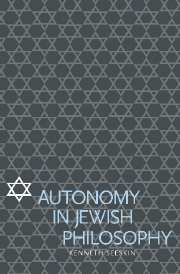Book contents
- Frontmatter
- Contents
- Preface
- Abbreviations
- 1 The problem of autonomy
- 2 Covenant and consent in the Bible
- 3 From the prophet to the sage
- 4 From the sage to the philosopher
- 5 The rise of modernity: Spinoza and Mendelssohn
- 6 The height of modernity: Kant and Cohen
- 7 Modernity under fire: Buber and Levinas
- 8 Conclusion: a partnership with God
- Bibliography
- Index
5 - The rise of modernity: Spinoza and Mendelssohn
Published online by Cambridge University Press: 22 September 2009
- Frontmatter
- Contents
- Preface
- Abbreviations
- 1 The problem of autonomy
- 2 Covenant and consent in the Bible
- 3 From the prophet to the sage
- 4 From the sage to the philosopher
- 5 The rise of modernity: Spinoza and Mendelssohn
- 6 The height of modernity: Kant and Cohen
- 7 Modernity under fire: Buber and Levinas
- 8 Conclusion: a partnership with God
- Bibliography
- Index
Summary
In the previous chapter, we saw that in Maimonides' view Biblical exegesis is based on a simple assumption: since the Torah is from God, it must be a source of truth. From this it follows that one cannot ascribe to it anything that can be shown on independent grounds to be false. We should keep in mind however that Maimonides' epistemology did not leave much room for intellectual revolutions. In his opinion earthly physics was perfected by Aristotle, and only a fool would argue with it. Since metaphysics is speculative, and the human mind is limited by its attachment to the earthly realm, he does not envision much in the way of progress there either. Essentially the same is true for astronomy, a discipline about which he claims that “man grasps nothing but a small measure of what is mathematical.” Though he admits there has been some progress in astronomy since Aristotle's day, and that a new theory may be able to account for anomalies like planetary orbits, given the distance of the heavenly bodies, and their superiority in place and rank, this is an admission in principle only. As for knowledge of God, it is well known that he thought we will never have more than a form of learned ignorance.
- Type
- Chapter
- Information
- Autonomy in Jewish Philosophy , pp. 119 - 148Publisher: Cambridge University PressPrint publication year: 2001



